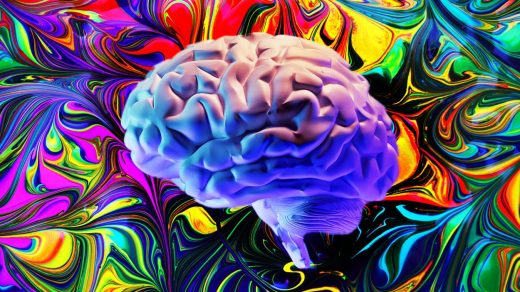Psychedelic therapy grows as a popular workplace benefit. Dr. Bronner’s says it pays off
By Jennifer Alsever
What if instead of just dental, vision, and health coverage, your employer paid mental health that included psychedelic therapy?
At least 50 companies have signed letters of interest to do just that, according to a new startup called Enthea, which is a third-party administrator of health insurance plans, but one that offers psychedelic healthcare as a workplace benefit. Under the plan, the companies would pick up the tab for employees who seek alternative treatments for depression, post-traumatic stress, and anxiety using ketamine therapy—and soon psilocybin therapy in some states.
That perk has already paid off for at least one company. A year-long analysis at Dr. Bronner’s natural soap company showed promise. Dr. Bronner’s picked up the cost for ketamine-assisted therapy for employees who wanted an alternative way to treat depression, post-traumatic stress syndrome, and generalized anxiety disorder. About 7% of Bronner’s 320 employees accessed the therapy, and anonymous surveys later found that employees showed an 86% improvement in post-traumatic stress disorder, a 67% reduction in major depressive disorder symptoms, and a 65% decline in generalized anxiety disorder symptoms.
A July poll by the University of Berkeley found that 61% of Americans support legalization of psychedelics, and Enthea is getting more inquiries by companies looking to help their employees, 25% of whom say their mental health has worsened in the last year. Gen Zers in particular are demanding more attention to mental health and some experts say they have been at the forefront of a push to change the mental health landscape.
“It’s starting to become far more mainstream,” says Enthea’s cofounder and CEO, Sherry Rais.
The Food and Drug Administration (FDA) in 2019 approved a ketamine derivative, esketamine, for the treatment of depression and it also designated psilocybin a breakthrough therapy for treating drug-resistant depression and major depressive disorder. Trials are now underway for MDMA treatment for PTSD. Oregon and Colorado both legalized the adult use of psilocybin that could open up decriminalization of other psychedelics. California voters will consider a similar ballot initiative in 2024.
The driver? A changing view of psychedelics and a desperate need for alternative mental health healing, Rais says. One study found that antidepressants work better than sugar pills just 15% of the time. Talk therapy and antidepressants combined improve outcomes. But some studies have found response rates to treatments like psilocybin to be as high as 80%. Studies have also found that psychedelics can promote neuroplasticity in the brain that enhances connectivity between different brain regions and results in a shift in consciousness and perception, and introspection and personal insight.
With the FDA approval, a number of startups have rushed to open ketamine clinics across the country, but some chains have struggled with profitability. Eager to grow fast, they’re not always offering the therapeutic counseling that experts say is needed to integrate the psychedelic experiences. Enthea assesses and vets those psychedelic-assisted therapy clinics on behalf of employers.
The test run with employees at Dr. Bronner’s is not surprising. Dave Bronner, Bronner’s CEO—cosmic engagement officer—at the 75-year-old family-owned company, has been a longtime vocal advocate for the use of psychedelics. He is on the board of the Multidisciplinary Association for Psychedelic Studies, which works to raise awareness and understanding of psychedelic substances, and his family’s company has donated millions to the organization and funded training centers for psychedelic integration therapy. He says he healed his own personal trauma through psychedelics, and his brother, Mike, who is the company’s president, found relief from depression through ketamine-assisted therapy.
Bronner says it’s vital that psychedelic healing come with the “therapeutic container” and lots of education. “It’s just a really powerful way to go inward and grapple with deep existential issues and trauma,” says Bronner. “These medicines are just so incredible and so needed, given the epidemic of mental health challenges we’re facing today.”
Correction: An earlier version of this story incorrectly stated that at least 50 companies were offering psychedelic therapy via Enthea. They have “signed letters of interest” to do so, according to the company.
Correction: An earlier version of this story incorrectly stated that the FDA in 2019 approved ketamine for the treatment of depression. It approved a ketamine derivative, esketamine, but not ketamine itself.
(16)



